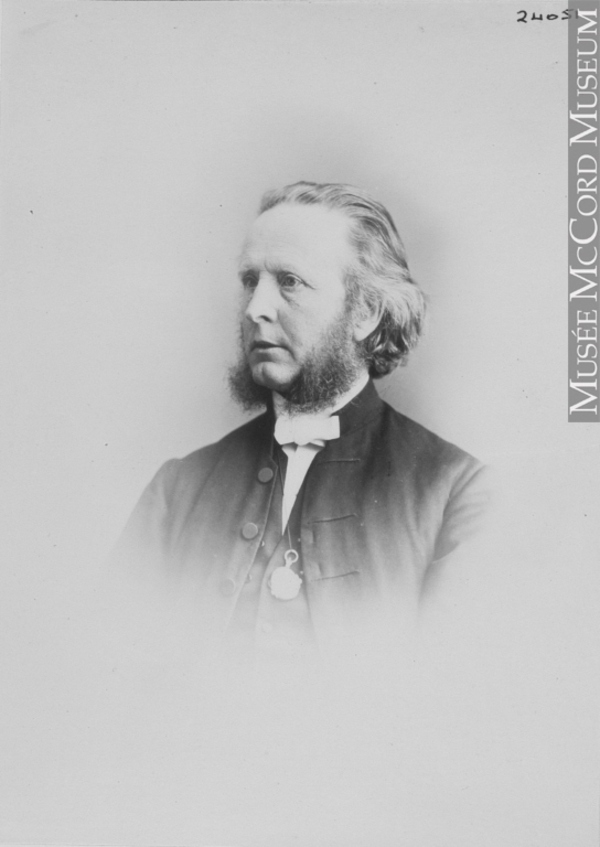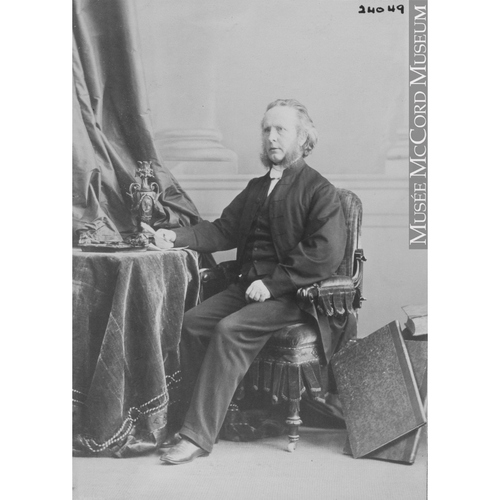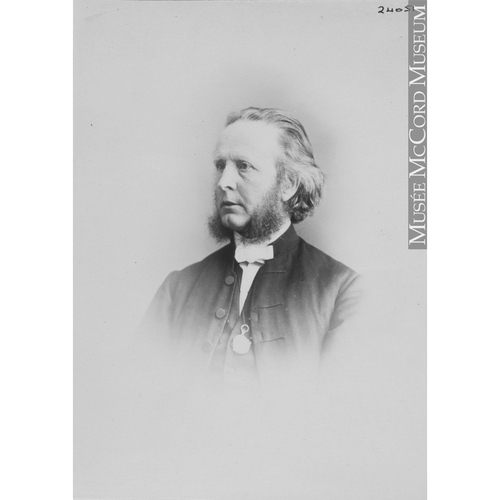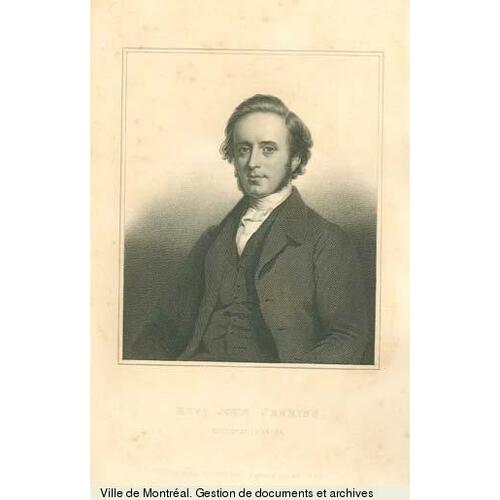
Source: Link
JENKINS, JOHN, Methodist and Presbyterian clergyman and author; b. 5 Dec. 1813 in Exeter, England, son of John Jenkins and Mary Evans; d. 12 April 1898 in Dulwich (London), England.
John Jenkins was educated at Redford College, Exeter, and King’s College, London; from 1835 to 1837 he attended the Wesleyan Theological Institution in Richmond (London), where he was a student of the celebrated John Hannah. Ordained in 1837, Jenkins was sent by the Wesleyan Methodist Missionary Society of London to Mysore, India, but had to be invalided home in 1841–42. From 1842 to 1844 he ministered to an English congregation in Malta, and then until 1847 he had a pastorate in western Cornwall.
That year Jenkins came to Montreal and took up the prestigious post of minister at Great St James Street Methodist Church. He soon established a reputation as an eloquent preacher and public lecturer. His congregation, however, was not doing as well as he. The optimism that in 1844–45 had inspired construction of a huge church had given way among the English-speaking commercial class of Montreal to pessimism and anger over economic depression and political conflict caused by the reform measures of the government of Louis-Hippolyte La Fontaine* and Robert Baldwin*. Popular frustration culminated in 1849 in the burning of the parliament buildings during the Rebellion Losses Bill riots and in the publication of the Annexation Manifesto [see James Bruce*], which several of the leading members of Jenkins’s congregation signed. With his congregation in financial difficulty, Jenkins travelled to Britain and the United States to raise funds, but he succeeded only in postponing a crisis. In 1852 the division of the British Wesleyan Methodists in Lower Canada into three circuits cost his church further support as many disgruntled members left to join the small New Connexion Methodist Church. This division preceded the proposal of the British Conference to transfer control of its Eastern District (Lower Canada) to the Canada Conference. Although Jenkins led the three-man delegation of British clergy in Canada to negotiate the transfer (completed in 1854), he may personally have been unhappy with the results.
In early 1853, at the height of the so-called “papal aggression” controversy, which was generated by the pope’s appointment of Roman Catholic bishops to England in 1850, Jenkins delivered a series of public addresses against Catholic doctrines that were attended by “very large and deeply-attentive” audiences. The publication of the lectures, A Protestant’s appeal to the Douay Bible, and other Roman Catholic standards, in support of the doctrines of the Reformation, went through four editions in 1853. That June, as a result of his lectures, Jenkins was asked to introduce the inflammatory Italian ex-Barnabite and revolutionary Alessandro Gavazzi, whose speech before a huge crowd in Zion Church resulted in a riot. Jenkins’s efforts at combatting “Romanism” were commended by the District Meeting, Canada East District, of the British Wesleyan Methodist Church in Canada and he was rewarded with a gift of $1,000 and a service of plate from members of his congregation.
In the autumn of 1853 Jenkins accepted a call to a Presbyterian church in Philadelphia, and in November he was received by presbytery there “on his own terms,” namely that he could continue to uphold the Arminian teaching of free will over the Calvinist doctrine of predestination. As well as ministering to his congregation, he was for ten years co-editor of the Presbyterian Quarterly Review (Philadelphia). As an Englishman, however, he found it difficult to exercise his ministry in that city when feelings against Britain ran high following the start of the American Civil War, and in 1863 he returned to England and joined the English Presbyterian Church. He stayed only briefly before moving again to Montreal later that year.
On 27 June 1865 Jenkins was inducted as minister of St Paul’s Church, which was in connection with the Church of Scotland and was one of the largest Protestant congregations in Montreal. St Paul’s was sold in 1866 by auction as commercial property, and a huge new edifice was built on Rue Dorchester (Boulevard René-Lévesque). Elected moderator of the Montreal-Ottawa Synod in 1869 and 1878, Jenkins was also elected, in the latter year, moderator of the General Assembly of the Presbyterian Church in Canada. From 1876 to 1881 he was convenor of the General Assembly’s committee on the Presbyterian Record, the church’s official organ. As well, from 1853 to 1885 he published numerous sermons, lectures, and biographical notices of ministers.
Jenkins demonstrated the usual Presbyterian interest in education. He served as chairman of Montreal’s Protestant Board of School Commissioners from 1866 to 1878, was a member of the corporation of McGill College, Montreal, and was a trustee of Queen’s College, Kingston, Ont. In 1859 he had been awarded an honorary dd by the College of the City of New York, and in 1879 McGill conferred on him an lld and made him a governor’s fellow for his service to education. In addition, he was for a time president of the Literary Club in Montreal.
Repeatedly disabled by attacks of bronchitis in winter, Jenkins retired from St Paul’s in the autumn of 1881 with an allowance of $2,000 a year. He preached occasionally until 1887, however, and remained a member of the Presbytery of Montreal until 1891. According to a contemporary, “He was rather small . . . but exceedingly handsome and presentable – fair and florid in complexion.” He had married Harriet Shepstone of Mysore in 1837, and they had had seven children before her death in 1875; one, John Edward, became a prominent author and politician in England. In 1877 Jenkins married Louisa Mary MacLennan, daughter of a Scottish Presbyterian minister. He spent his last years in England, where he died in April 1898; he was buried in Norwood Cemetery, London.
John Jenkins is the author of The faithful minister: a memorial of the late Rev. William Squire . . . comprising the funeral sermon . . . and a brief sketch of his life and labours (Montreal, 1853); A Protestant’s appeal to the Douay Bible, and other Roman Catholic standards, in support of the doctrines of the Reformation (Montreal, 1853); Thoughts on the crisis (Philadelphia, 1860); Two fast day discourses preached in Philadelphia in relation to the Civil War (Philadelphia, 1862–63); Canada’s thanksgiving for national blessings in the year of Our Lord, 1865 . . . (Montreal, 1865); To the kirk-sessions and congregations of the Presbyterian Church of Canada in connection with the Church of Scotland ([Montreal, 1869]); “[Funeral sermon],” [James Croil], Life of the Rev. Alex. Mathieson . . . and three discourses preached by Dr. Mathieson . . . (Montreal, 1870); Sermons delivered at the opening of St. Andrew’s Church, Ottawa, 25th January, 1874 (Ottawa, 1874); Address at the opening of the new high school, Montreal, on May 21st, 1878 ([Montreal, 1878]); An address suggested by the death of H.R.H. the Princess Alice . . . (n.p., [1878]); Christian giving illustrated and enforced by ancient tithing . . . (Montreal, 1881); An address suggested by the death of H.R.H. the Duke of Albany (n.p., [1884]); and “Atheism or theism; which?” Questions of the day: lectures delivered in David Morrice Hall, Montreal, in 1883–84 (Montreal, 1885), 71–86.
PCC Acts and proc. Presbyterian (Montreal), 28 (1875): 226. Presbyterian Church of Canada in connection with the Church of Scotland, A historical and statistical report for the year 1866 (2nd ed., Montreal, 1868). Presbyterian Record (Toronto), 23 (1898): 125. Wesleyan Methodist Church in Canada, Minutes of twelve annual conferences, from 1846 to 1857 inclusive . . . (Toronto, 1863). Westminster (Toronto), [2nd] ser., 4 (January–June 1898): 395, 418–19. Christian Guardian, 1, 15 June, 23 Nov. 1853. Montreal Daily Star, 12 April 1898. Canadian biog. dict. Cornish, Cyclopædia of Methodism. Hand-book of the Presbyterian Church in Canada, 1883, ed. A. F. Kemp et al. (Ottawa, 1883). Morgan, Bibliotheca canadensis. Hew Scott et al., Fasti ecclesæ scoticanœ: the succession of ministers in the Church of Scotland from the Reformation (new ed., 9v. to date, Edinburgh, 1915– ), 7. Campbell, Hist. of Scotch Presbyterian Church. Carroll, Case and his cotemporaries, 5: 42. N. H. Mair, The people of St James, Montreal, 1803–1984 ([Montreal, 1984]). Robert [Philippe] Sylvain, Clerc, garibaldien, prédicant des deux mondes: Alessandro Gavazzi (1809–1889) (2v., Québec, 1962).
Cite This Article
John S. Moir, “JENKINS, JOHN,” in Dictionary of Canadian Biography, vol. 12, University of Toronto/Université Laval, 2003–, accessed December 30, 2025, https://www.biographi.ca/en/bio/jenkins_john_12E.html.
The citation above shows the format for footnotes and endnotes according to the Chicago manual of style (16th edition). Information to be used in other citation formats:
| Permalink: | https://www.biographi.ca/en/bio/jenkins_john_12E.html |
| Author of Article: | John S. Moir |
| Title of Article: | JENKINS, JOHN |
| Publication Name: | Dictionary of Canadian Biography, vol. 12 |
| Publisher: | University of Toronto/Université Laval |
| Year of publication: | 1990 |
| Year of revision: | 1990 |
| Access Date: | December 30, 2025 |





